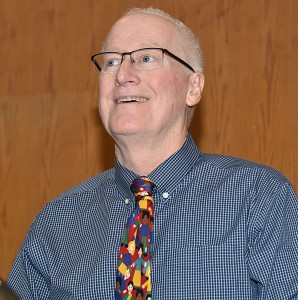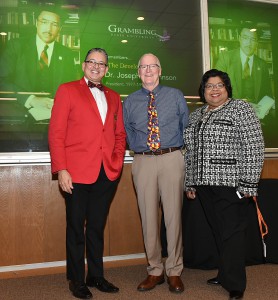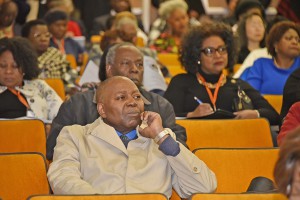EXPERT: STUDENTS NEED MORE ENGAGEMENT
Arkansas higher education professor tells Grambling State faculty digitally connected youth respond to updated teaching methods
By WILL SUTTON/GSU Media Bureau
Using a lively, engaging and laughing approach, Mark Taylor was serious about the business of teaching today’s college students. He told a group of Grambling State University faculty that Generation NeXt doesn’t respond well to straightforward lectures, and if they really want them engaged, they must set clear expectations and involve them in ways that they will respond to in the classroom. 
During a Friday (Jan. 5) faculty institute program in the Smith Nursing Building auditorium, Taylor said told an attentive audience that teaching digitally-connected teens and twentysomethings is different from teaching the students they may have taught for years or even decades. He said it’s important to keep their orientations in mind and use a different pedagogical approach. He suggested getting students thinking about the future professionals they want to be and talking with them that way; getting students to identify their individual goals and connecting those goals with class goals and “flipping” the class learning from inside the classroom to outside-of-class homework and reading so class time is far more participatory.
In addition, Taylor, 62, said there must be a clear expectation that class attendance is important, giving students credit for attending with advance preparation and earning a “ticket” to actively participate in classes. Taylor, a a former HBCU professor who advises and speaks on best practices in teaching and learning, said “whoever does the work does the learning,” so those who have not prepared should sit elsewhere in the class and get the work done that they should have done in advance because class should be reserved for student interaction.
Finally, the Little Rock, Arkansas, expert said formative and summative assessments will improve accountability and assessments with research-based approaches. Taylor said his goal is the same for all higher education teachers: to help them better connect students with course content, but he has a special desire for those who teach at historically black colleges and universities. 
“Remember that the mission is to provide access and high expectations in a nurturing environment, and I sincerely believe that understanding this generation of learners, and both the gifts and challenges that they bring to college,” he said in an interview after the program, “We can help students develop not only skills they need in the workplace but also the skills they need to navigate the culture of the future.”
Taylor, who has presented to dozens of corporate and college clients across the nation, got high marks from his GSU “students” for the day.
“I thought it was tremendously valuable. I thought it was very on point and appropriate,” said Robbie Morganfield, head of the school’s Department of Mass Communication. “Based on some past experiences I had been doing some of the things, but what I appreciated about his presentation was that he gave me a paradigm. He gave me a structure to use to make even more sense out of some of the approaches that I’ve been attempting.”
He said Taylor shared methods that, if the GSU faculty adopts them, “it really can help us accelerate and elevate student learning.” Morganfield said connecting classroom learning to industry expectations is especially important because “without that we become irrelevant.”
GSU Provost and Vice President for Academic Affairs Ellen D. Smiley decided to bring Taylor in when she saw him present at a recent conference. “The Academic Affairs Institute provides professional development for the enrollment management and academic units that make up the Division of Academic Affairs,” she said. “Dr. Taylor’s workshop provided key details that will enhance communication and the delivery of instruction to the various generations who constitute our enrollment. Methods to promote student success are the guiding forces that dictate our actions.” 
Adarian Williams, a junior who is the GSU Student Government Association president, attended the program and came away impressed and excited about the possibilities.
“A lot of the plans and the teaching model are definitely something our faculty can take into the classroom because the Generation NeXt that we’re dealing with is a generation that will continue to grow and the faculty has to grow with it so they can teach us to go out and do great things in the world,” said Williams. He said “getting more interactive, getting students more into research work and…getting them accustomed to research and a newer way of learning with technology” is something he’s certain his colleague students would appreciate.
###


